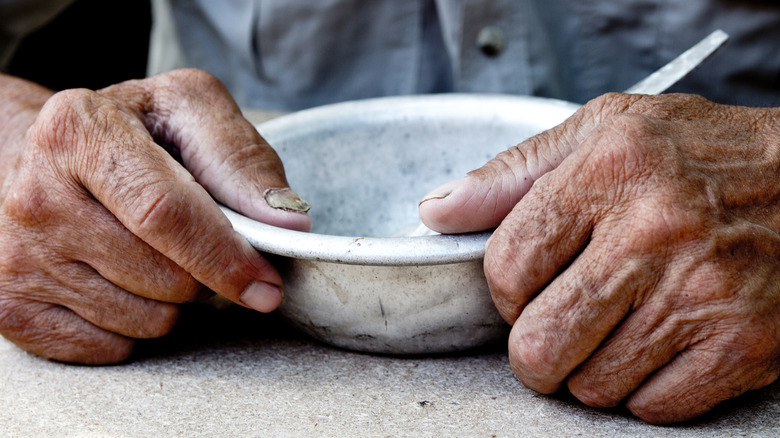The Minnesota Starvation Experiment's Findings Confirmed What We All Suspected
Scientific experiments are — ideally, anyway — carried out according to ethical principles, according to recommendations from the American Psychological Association. And when it comes to living people being part of an experiment, the rules are even stricter. Scientists should take great care not to injure, sicken, or kill the subjects. It hasn't always been so, and over the centuries, some scientists have taken unethical shortcuts, such was when Edward Jenner deliberately infected a young boy with cowpox and then smallpox to see if the former would prevent the latter. The boy survived, paving the way for vaccines and the eventual eradication of the disease, but most modern scientists would be horrified at the idea of a potentially deadly experiment carried out on a child, regardless of how high the stakes are.
Back in World War II, the stakes were equally high. Millions of Europeans were starving as a result of World War II, especially those who had survived concentration camps. According to the Duke Health Center for Eating Disorders, doctors were keen to learn the best way to provide nutrition to someone near death from starvation. To figure that out, they had to starve volunteers. The experiment has come to be known as the "Starvation Experiment."
Refeeding syndrome
Imagine that a person who is nearly starved to death is in your care. Your first instinct would be to feed them, right? Not so fast: As Medical News Today explains, the body of a person who has gone a significant amount of time without the proper nutrition will be significantly different from that of a properly-nourished person. In order to preserve itself, the balance of electrolytes and fluids in the body will be out of whack. Introducing too much nutrition too soon can wreak havoc on an already-weakened body, by causing heart problems, lung problems, and muscle problems, among multiple others. This has since come to be called "Refeeding Syndrome," and it can be fatal.
Allied doctors during World War II were faced with how to refeed potentially millions of people. In order to do it properly, they needed to starve some people and then figure out best practices in terms of refeeding them. Starving people without their consent is problematic in the extreme, so according to Duke University Center for Eating Disorders, the military sought out volunteers. They found them.
The volunteers
The researchers needed a number of healthy young men to study. Unfortunately, World War II was raging, and the number of available warm bodies was limited. However, there was the Civilian Public Service, a stateside program into which conscientious objectors who wouldn't serve in the armed forces due to religious, cultural, or moral reasons were given a legal alternative to military service — fighting fires, working as orderlies in hospitals, and other roles, according to a website devoted to the program.
To participate in the starvation experiment, the men had to be in good physical and mental health, and equally importantly, according to Duke Health, be philosophically invested in relief and rehabilitation. The men would have to starve themselves for several weeks, subject themselves to experimental refeeding, and write down their experiences. It was a big ask, since the men would be subjected to prolonged physical and mental discomfort. Two hundred men volunteered, according to the American Psychological Association, and 36 of them wound up participating in the experiment.
The experiment
In November 1944, according to the American Psychological Association, the men moved into their temporary home at the University of Minnesota. They were allowed to attend classes and do other things that U of M students could do, but their food intake was tightly controlled and monitored. For the first phase, they ate normal diets. For the second, their diets were severely restricted, and were limited to foods available to poor Europeans at the time, such as potatoes. During this phase, some participants lost as much as 25% of their body weight. For the third phase, they were allowed to eat whatever they wanted; some consumed between 7,000 and 10,000 calories per day during this period, according to Duke Health.
During the experiment, the participants were monitored by psychologists and physicians, and the men were required to keep journals. They had to work 15 hours per week in the lab and walk 22 miles per week, as well as participate in 25 hours of educational activities.
The conclusions
To absolutely no one's surprise, the men weren't living their best lives while they were starving. So preoccupied were they with food, according to Duke Health, that it was basically all they could think about, 24/7. When they were given their meager rations, some became defensive over their food, guarding it with their elbows. Others broke social protocol and licked their plates clean. Others expressed anger toward the regular students who had limitless food and "wasted" it by throwing it away. Some so obsessively chewed gum that they developed oral problems. Others took up smoking, for whatever relief it offered.
When they were allowed to eat unchecked again, researchers found psychological issues related to this re-discovered freedom. Some ate so much they made themselves sick. Some could no longer read their own hunger cues and would go into binging/purging cycles.
There were long-term effects, too. Some of the participants changed career paths afterwards, and at least a couple went into food service, including three who became chefs and one who went into agriculture.
What does it all mean?
Though the experiment was carried through to its conclusion, according to the American Psychological Association (APA), it didn't produce the results the researchers were hoping for. That's because the war in Europe ended even as the experiment was taking place, and Allied doctors were left without a clear path forward when it came to dealing with starving Europeans. "Simply put, starving people needed calories. Food and lots of it was the key to rehabilitation. It was as true for those released from the laboratory in Minnesota as it was for those freed from the privations of war in Europe," the APA notes. A booklet titled "Men and Hunger: A Psychological Manual for Relief Workers" was published in 1946, produced as a result of the experiment's findings.
Meanwhile, there were and are implications of this experiment beyond mass starvation brought about by war or famine. For example, there's a relationship between eating disorders and the psychological changes brought on by malnourishment. "It is possible that the food preoccupation that accompanies extreme caloric depletion is reinforcing in the sense that the individual struggling thinks less about other things that may be stressful — but seemingly less in the individuals' 'control.' In this way, the starvation of anorexia nervosa is functioning as a distraction or avoidance behavior," notes Duke Health. This key bit of information may help parents of children with eating disorders understand their behavior better, including their children's food preoccupations and rituals not as defiance, but as a result of their malnutrition.





